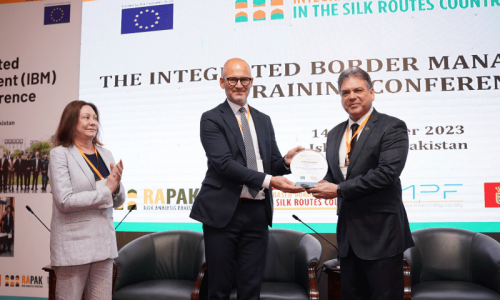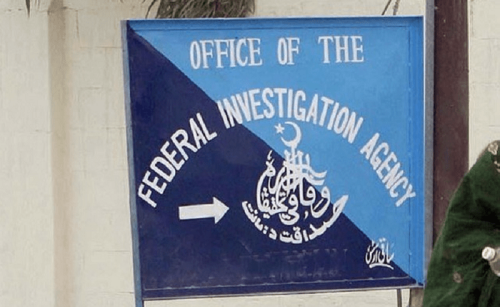THE 12th session of the Conference of the Parties to the UN Convention Against Transnational Organised Crime (UNTOC) was held in Vienna on Oct 14-18, 2024.
It was heartening to note the surge in civil society representation which increased by over 90 per cent. Some 200 NGOs/CSOs participated and interacted with senior delegates of 192 state parties to the UN Convention during the plenary and around 65 side events.
The outgoing president of the COP mentioned the addition of three states, including Pakistan, to the list of countries that have ratified the UNTOC’s Trafficking in Persons Protocol since 2022. During the general discussion on the convention, the DG FIA made a formal statement on behalf of the Pakistani government, highlighting the progress achieved in the review process.
During the review of the implementation of UNTOC, this writer, representing an alliance of 35 Pakistani NGOs/CSOs and 65 national experts on organised crime, had the opportunity to present civil society’s outlook on a strategy to ensure meaningful civil society engagement to achieve two outcomes. The first of these outcomes was that civil society perspectives were incorporated into the UNTOC review mechanism process in an impactful manner; and the second, the CSO community working against organised crime came together on a single platform to engage with the review mechanism.
One of the key initiatives of the UNODC is to initiate voluntary country-specific ‘pilot initiatives’ by interested member states, aimed at strengthening cooperation between the concerned national authorities, CSOs, academia, and the private sector. Mexico was the first country to launch the pilot initiative. Pakistan was the second globally, and the first in Asia, to launch the pilot initiative on the UNTOC review in Islamabad in September 2022.
All parties need to raise their commitment to ensuring the effective implementation of the UNTOC.
Since then, Kenya and Angola have also launched voluntary pilot initiatives. Chile is to follow soon. In a special side event on strengthening multi-stakeholder collaboration against transnational organised crime, Pakistan was cited in the context of international best practices regarding a joint strategy by the state and civil society to undertake meaningful engagement during the first cluster of the review mechanism on ‘criminalisation and jurisdiction’. A trilateral cooperative framework between the Pakistani government, the civil society alliance and the UNODC has provided the impetus for laying a long-term roadmap for the UNTOC mechanism under forthcoming review clusters.
Civil society in Pakistan has published two annual reports for 2022 and 2023 on the progress in implementation of the review mechanism. The interior ministry established an UNTOC review secretariat in the National Police Bureau where some experts from civil society were embedded to deliberate on responses to the self-assessment questionnaires required to be submitted to Pakistan’s two peer review countries.
The credit for these initiatives goes to the Pakistani government’s national focal person, currently the DG of the newly established Anti-Money Laundering Authority. One must also acknowledge the proactive and responsive engagement approach adopted since 2022 by our current and former ambassadors, the permanent representatives of Pakistan’s mission in Vienna.
Since the adoption of the UNTOC (2000-2003), long negotiations on the review mechanism were initiated following the first COP in 2004. In 2018, at the ninth COP a mechanism was agreed on. However, civil society’s access to the review process remained a key point of contention. The actual operation of the review mechanism started in 2020 when Pakistan was placed in the first group of 62 countries to commence the review process. Pakistan could not initiate the review process as the national focal person had not yet been appointed by our government.
However, on the initiative of civil society, the government appointed one in January 2022. Fortunately, as a professionally sound senior police officer, he happened to be the notified national expert on organised crime. Since then, Pakistan’s progress in the review process has been impressive, with almost all the cluster-1 review requirements fulfilled. The only delay is on the part of the peer review countries.
Representatives of Pakistan’s civil society alliance have participated in all the dialogues held in Vienna since 2022 on the three UNTOC Protocols on Firearms, Trafficking in Persons, and Smuggling of Migrants. In addition, civil society input was also given during the CD (constructive dialogues) on international cooperation and technical assistance. Based on the experience and interactions over the last three years, the Vienna-based Alliance of NGOs on Crime Prevention and Criminal Justice, came up with the first-ever civil society declaration on the UNTOC during the recent COP. The clear objectives are to raise the level of civil society engagement with member states, ensure that its inputs are coordinated and disseminated effectively, highlight key procedural and substantive issues, and build a strong global network of collaboration.
The 2024 Vienna civil society UNTOC declaration is aimed at pushing back against efforts to limit or silence civil society voices, and at protecting and defending those uncovering corruption and related efforts contributing to organised crimes. It recognises the unique position of civil society as a bridge-builder and reaffirms the need for integration of civil society engagement with communities and victims. It recommends survivor-centric, trauma-informed and human rights-based approaches.
The declaration seeks a better and coordinated whole-of-society approach to dealing with serious and organised crimes. As we approach the 25th anniversary of the adoption of the UNTOC, the slow pace of the review mechanism since 2020 is a cause of concern. All parties need to redouble their efforts and raise their commitment to ensuring the effective implementation of the convention.
While the efforts of Pakistan’s institutions and civil society in this endeavour have been recognised by the international community in the first phase of the review mechanism, it is essential that long-term political commitment is ensured for holistic implementation, in active collaboration with partners in civil society.
The writer is director of the Centre for Governance Research Pakistan and vice chair of the Board of Vienna-based Alliance of NGOs on Crime Prevention and Criminal Justice.
Published in Dawn, October 26th, 2024














































Dear visitor, the comments section is undergoing an overhaul and will return soon.